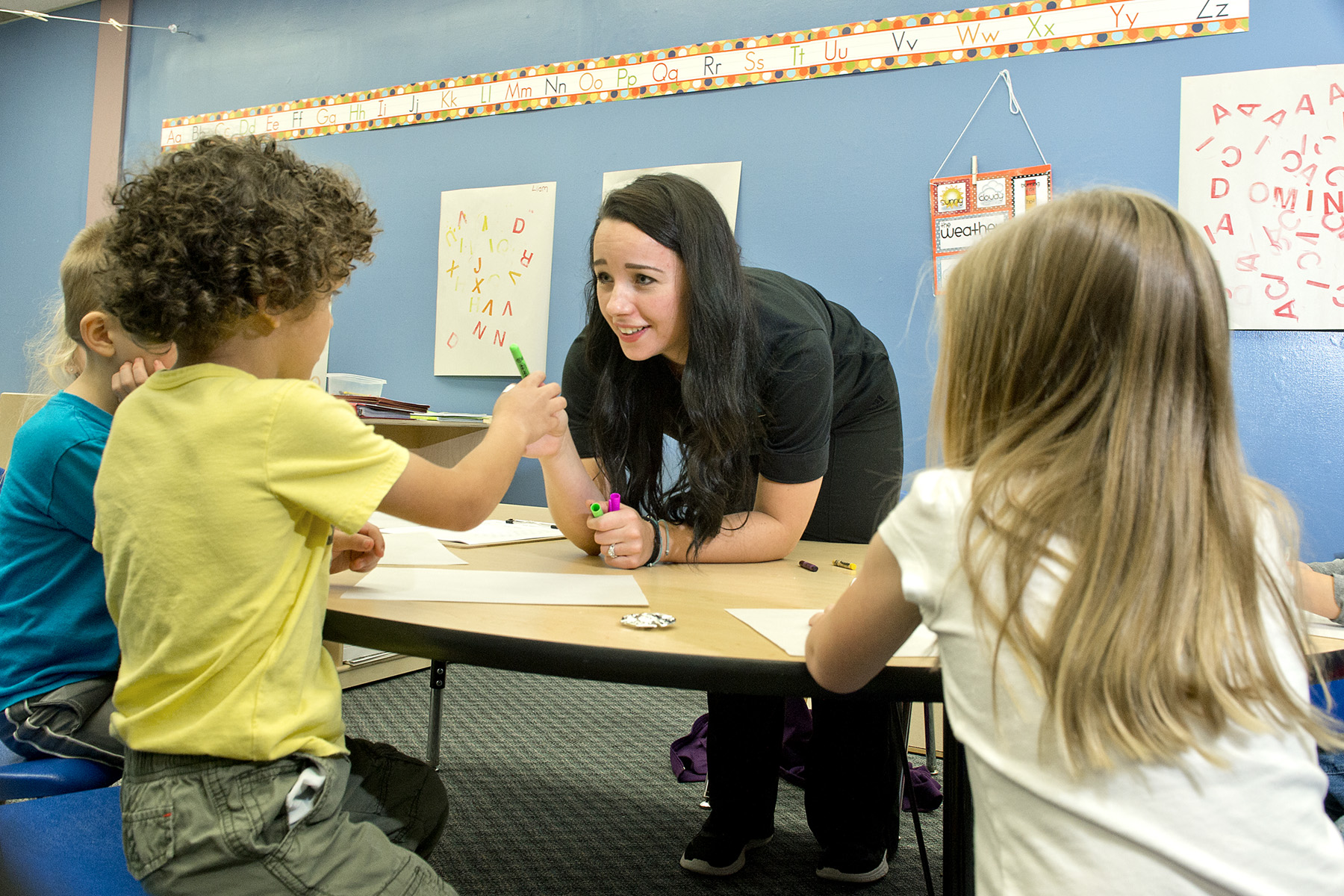Through rigorous coursework and experiential learning, students in the autism studies minor will cultivate a deep understanding of Autism Spectrum Disorder (ASD) and be prepared for a career supporting autistic individuals and their families.
Students in the autism studies minor have the opportunity to participate in:
- Spectrum Education Center Internship - spend several hours weekly working at a site that provides services for people with developmental disabilities
- PEERS Program Mentor Training - learn and practice implementing social evidence-based skill interventions while working with autistic adolescents and young adults
- Registered Behavior Technician Training - gain a practical working knowledge of the principles of Applied Behavior Analysis, while preparing to take the board certification exam and begin work in the field
-
Required Courses
CurriculumPSY 290 Introduction to Autism (4 credits)
SPE 200 Introduction to Developmental Disorders (4 credits)
SPE 205 Registered Behavior Technician Training (2 credits)
SPE 499 Spectrum Education Center Internship (4 credits)
SPE 210 PEERS Program Mentoring Training (2 credits) OR ISP 220 Intro to Exceptional Learners (4 credits)
Total: 16-18 credits
Introduction to Autism (PSY 290 – 4 credits)
This course is designed for students interested in learning more about people with autism spectrum disorders. In this course students will gain an understanding of the characteristics and incidence of autism, and the implications for children's learning, behavior and ability to process information. Students will explore the latest research on potential causes, best practices for assessment and intervention, areas of impairment, as well as current issues related to autism services.
Introduction to Developmental Disorders (SPE 200 – 4 credits)
In this course students will learn about the philosophies, terminologies, and concepts that will enable them to work more effectively with people who have developmental disabilities. Students will get the foundational knowledge needed for teaching, assisting, and working with people with disabilities. They will learn how to identify different behavioral patterns and implement effective strategies to manage challenges.
Registered Behavior Technician Training (SPE 205 – 2 credits)
This course provides a practical working knowledge of the basic principles of Applied Behavior Analysis (ABA) as approved by the Behavior Analytic Certification Board (BACB). Students who complete this course are prepared to take the board certification exam and begin work in the field.
Spectrum Education Center Internship (SPE 499 – 2-8 credits)
This is an experienced-based course in which students spend 6-24 hours (dependent on credit hours) per week working with a site that provides services for people with developmental disabilities. Supervision is jointly provided by the cooperating site and the Spectrum Education Center. Graded S/U.
PEERS Program Mentor Training (SPE 210 – 2 credits)
This course is designed for undergraduate students who wish to work with adolescents on the autism spectrum. The experiential learning component of this course is conducted as part of the PEERS (Program for the Education and Enrichment of Relational Skills) Program, which is offered through the Spectrum Education Center. PEERS is an evidence- based social skills intervention program for adolescents who are interested in learning ways to help them develop friendships. Students in this course learn and practice implementing social skill interventions.
Intro to Exceptional Learners (ISP 220 – 4 credits)
This course is based on standards set by the Council for Exceptional Children (CEC), includes a focus on the cognitive, social, and behavioral development of typical and atypical learners. An understanding of the relationship of special education to schools, school systems, and other agencies is emphasized. Field experience is required in order to complete course assignments. Prerequisite: EDU 150 or MUS 150.
-
Goals and Objectives
Goal 1
Graduates of the Autism Studies Minor will know and understand the potential causes, symptoms and diagnostic criteria of Autism Spectrum Disorders as well as the specific needs of individuals with autism across the lifespan and how they are treated.- Objective 1.1
Demonstrate knowledge of the current theories on the causes of Autism Spectrum Disorders. - Objective 1.2
Demonstrate knowledge of the frequency, characteristics, symptoms, and diagnostic criteria of individuals with Autism Spectrum Disorders. - Objective 1.3
Demonstrate knowledge of the nature of stereotypes, stigma, and discrimination of individuals with Autism Spectrum Disorders.
Goal 2
Graduates of the Autism Studies Minor will know and understand the specific behavioral needs of individuals with Autism Spectrum Disorders as well as behavior-based and alternative interventions to behaviors frequently displayed by individuals with Autism Spectrum Disorders.- Objective 2.1
Identify the behavioral excesses and deficits frequently displayed by children and adults with Autism Spectrum Disorders and demonstrate understanding of approaches to treating behaviors using interventions grounded in Applied Behavior Analysis as well as medically related therapeutic services. - Objective 2.2
Demonstrate the ability to communicate orally and in writing in the language of the discipline and the principles of Applied Behavior Analysis
Goal 3
Graduates of the Autism Studies Minor will understand, follow and demonstrate the ethical guidelines and professional codes of conduct for working with individuals with autism.- Objective 3.1
Demonstrate the roles and responsibilities of behavior analysts, therapists, allied health professionals and related staff, and demonstrate understanding of ethics guidelines in working with individuals with autism. - Objective 3.2
Demonstrate understanding of ethical guidelines in working with individuals with autism.
Goal 4
Graduates of the Autism Studies Minor will identify and understand the difficulties that families face in coping with Autism Spectrum Disorders.- Objective 4.1
Identify the impact on parents, siblings, families, and friends of individuals with Autism Spectrum Disorders and demonstrate how to best help these individuals cope with associated stress.
Goal 5
Graduates of the Autism Studies Minor will demonstrate how to collect behavioral data using Applied Behavior Analysis; to measure the progress and to develop behavior intervention plans for individuals with Autism Spectrum Disorders.- Objective 5.1
Collect data on the progress of individuals with Autism Spectrum Disorders and develop behavior plans. - Objective 5.2
Identify and demonstrate methods to empirically assess and evaluate the behavior of individuals with autism spectrum disorders for the purpose of developing intervention plans.
- Objective 1.1
